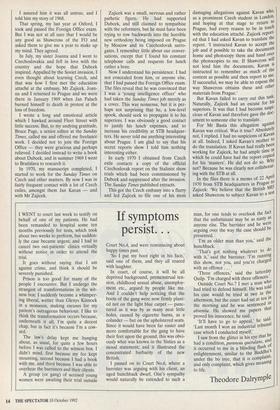If symptoms
persist. .
I WENT to court last week to testify on behalf of one of my patients. He had been remanded to hospital some ten months previously for tests, which took about two weeks to perform, but sudden- ly the case became urgent, and I had to cancel two out-patients' clinics virtually without notice in order to attend the trial.
It goes without saying that I am against crime, and think it should be severely punished.
Prison is too good for many of the people I encounter. But I undergo the strangest of transformations in the wit- ness box: I suddenly become a whimper- ing liberal, wetter than Glenys Kinnock in a monsoon, making excuses for my patient's outrageous behaviour. I like to think the transformation occurs because, underneath it all, I'm quite a decent chap, but in fact it's because I'm a cow- ard.
The law's delay kept me hanging about, as usual, for quite a few hours before I was called to the witness box. I didn't mind, first because my fee kept mounting, second because I had a book with me, and third because I was able to overhear the barristers and their clients.
A group (or gang) of accused young women were awaiting their trial outside Court No.4, and were reminiscing about happy times past.
`So I put my boot right in his face,' said one of them, and they all roared with laughter.
In court, of course, it will be all deprived background, premenstrual ten- sion, childhood sexual abuse, unemploy- ment etc., argued by people like me. And I couldn't help noticing that the boots of the gang were now firmly plant- ed not on the light blue carpet — punc- tured as it was by as many neat little holes, caused by cigarette burns, as a colander — but on the upholstered seats. Since it would have been far easier and more comfortable for the gang to have their feet upon the ground, this was obvi- ously what was known in the Sixties as a mood statement; and it illustrated the concentrated barbarity of the new British.
I passed on to Court No.6, where a barrister was arguing with his client, an aged hunchback dwarf. One's sympathy would naturally be extended to such a man, for one tends to overlook the fact that the unfortunate may be as nasty as anyone else. The barrister and he were arguing over the way the case should be presented. `I'm an older man than you,' said the hunchback. :That's got nothing whatever to do with it,' said the barrister. 'I'm running this show, not you, and you're charged with an offence . . . ' `Three offences,' said the latterdar Quilp. 'I'm charged with three offences. Outside Court No.7 I met a man who had tried to defend himself. He was told his. case would be tried at two in the afternoon, but the court had sat at ten M the morning and he was sentenced In absentia. He showed me papers that proved his innocence, he said. `It'll have to go to appeal,' he said. `Last month I won an industrial tribunal case which I conducted myself.' I saw from the glitter in his eye that he had a condition, paranoia querulans, and it occurred to me in a blinding flash of enlightenment, similar to the Buddha s under the bo tree, that it is complaint' and only complaint, which gives meaning to life.
Theodore Dalrymple


























































 Previous page
Previous page